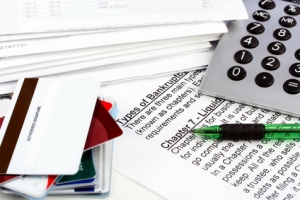Individual Bankruptcy: Chapter 7 vs. Chapter 13
 Chapter 7 bankruptcy is designed for people who, no matter how hard they work, will find it nearly impossible to ever pay off all their debts and be able to afford daily necessities at the same time. A sale of the debtor’s assets is conducted and the money raised is distributed among his or her creditors. While the stigma of the bankruptcy and the damage to the individual’s credit will last for years the person can usually walk away from bankruptcy free from prior debts, with notable exceptions.
Chapter 7 bankruptcy is designed for people who, no matter how hard they work, will find it nearly impossible to ever pay off all their debts and be able to afford daily necessities at the same time. A sale of the debtor’s assets is conducted and the money raised is distributed among his or her creditors. While the stigma of the bankruptcy and the damage to the individual’s credit will last for years the person can usually walk away from bankruptcy free from prior debts, with notable exceptions.
In 2005, Congress passed the Bankruptcy Prevention and Consumer Protection Act of 2005 (BAPCPA) which resulted in several changes to the United States Bankruptcy Code. One adjustment was that it made it much more difficult for individuals to file under chapter 7.
This is where chapter 13 bankruptcy becomes an option. 11 U.S.C. §13 specifically provides for a way for “wage earners” to keep their assets and avoid continued collection activity by agreeing to pay off their debts over a fixed period of time.
- Under chapter 13, a debtor voluntarily suggests a specific plan to to pay his or her creditors over a 3-5 year period. The precise amount of time allowed for the payments to be completed is determined by a debtor’s current monthly income. (11 U.S.C. §1322(d))
A document known as a chapter 13 plan is filed with a debtor’s petition. This written plan details all of the payments and when they are expected to be made. The plan details the treatment of debts, liens and lists the status of all the debtor’s assets and liabilities. The goal of the system is to allow a debtor with a relatively steady flow of income to find a way to pay the amounts owed without having to surrender any assets.
Some of the advantages of chapter 13 bankruptcy:
- You can stop a foreclosure of your property.
- If you have loans coming due soon, you can spread out the payments over the next five years instead of having to pay them off all at once.
The major problems people experience with chapter 13:
- You have to make your payments on time.
- If you do not complete the payment plan as scheduled, you may end up owing your original debt plus retroactive interest.
Filing for bankruptcy though chapter 13 is no magic bullet – it comes with many potential pitfalls, just as other personal bankruptcy options. However, it may be worth it for some individuals.
For those who are instead thinking of turning to debt consolidation companies to help solve their problems, you may be making a costly mistake. Individuals who are considering debt consolidations companies to assist with their debt consolidation may be making a costly mistake. While some of these businesses are legitimate, others are not and may make an individual’s situation considerably worse. These companies often put the money you give them towards paying their monthly “service fees” rather than actually using it to help pay down your debts.
If you think you may qualify for bankruptcy and would like to discuss your options with a lawyer specializing in bankruptcy, please contact Adrienne Woods.
 Adrienne Woods
Adrienne Woods
The Law Offices of Adrienne Woods, P.C.
[email protected]
917.447.4321
![]()

 Updated daily, this blog will keep you informed on the latest bankruptcy news!
Updated daily, this blog will keep you informed on the latest bankruptcy news!  Learn more about how Bankruptcy works and what you need to know.
Learn more about how Bankruptcy works and what you need to know.